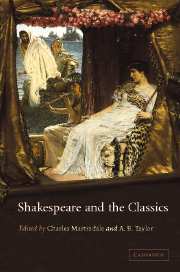Book contents
- Frontmatter
- Contents
- Notes on contributors
- List of abbreviations
- Introduction
- PART I AN INITIAL PERSPECTIVE
- PART II ‘SMALL LATINE’
- PART III ‘LESSE GREEK’
- 10 ‘Character’ in Plutarch and Shakespeare: Brutus, Julius Caesar, and Mark Antony
- 11 Plutarch, Shakespeare, and the alpha males
- 12 Action at a Distance: Shakespeare and the Greeks
- 13 Shakespeare and Greek romance: ‘Like an old tale still’
- 14 Shakespeare and Greek tragedy: strange relationship
- PART IV THE RECEPTION OF SHAKESPEARE'S CLASSICISM
- Select bibliography (compiled by Joanna Paul)
- Index
11 - Plutarch, Shakespeare, and the alpha males
Published online by Cambridge University Press: 22 September 2009
- Frontmatter
- Contents
- Notes on contributors
- List of abbreviations
- Introduction
- PART I AN INITIAL PERSPECTIVE
- PART II ‘SMALL LATINE’
- PART III ‘LESSE GREEK’
- 10 ‘Character’ in Plutarch and Shakespeare: Brutus, Julius Caesar, and Mark Antony
- 11 Plutarch, Shakespeare, and the alpha males
- 12 Action at a Distance: Shakespeare and the Greeks
- 13 Shakespeare and Greek romance: ‘Like an old tale still’
- 14 Shakespeare and Greek tragedy: strange relationship
- PART IV THE RECEPTION OF SHAKESPEARE'S CLASSICISM
- Select bibliography (compiled by Joanna Paul)
- Index
Summary
In the Folio text of Coriolanus, a recitation of the title character's family tree seems to have a lacuna:
Of the same House Publius and Quintus were,
That our best Water, brought by Conduits hither,
And Nobly nam'd, so twice being Censor,
Was his great Ancestor.
The transition between the second and third lines does not quite make sense, but help is to hand on the opening page of Plutarch's Life of Coriolanus in Sir Thomas North's translation: ‘Of the same house were Publius, and Quintus, who brought Rome their best water they had by conducts. Censorinus also came of that familie, that was so surnamed, bicause the people had chosen him Censor twise’ (2.143; Coriolanus 1.1). A nineteenth-century German, Nicolaus Delius, retrieved from North's phrasing the pentameter now recognised as the missing line:
Of that same House Publius and Quintus were,
That our best Water brought by Conduits hither,
And Censorinus that was so surnam'd,
And Nobly named so, twice being Censor,
Was his great Ancestor.
2.3.241–5Emendation is rarely so blessed with evidence that the critic is retracing the footsteps of the author. Geoffrey Bullough calls Shakespearean source study ‘the best, and often the only, way open to us of watching Shakespeare the craftsman in his workshop’; the passage from Coriolanus is part of the ballast for that generalisation, which taken to some extremes can seem dubious but in particulars like these is all but incontrovertible.
- Type
- Chapter
- Information
- Shakespeare and the Classics , pp. 188 - 206Publisher: Cambridge University PressPrint publication year: 2004
- 6
- Cited by



